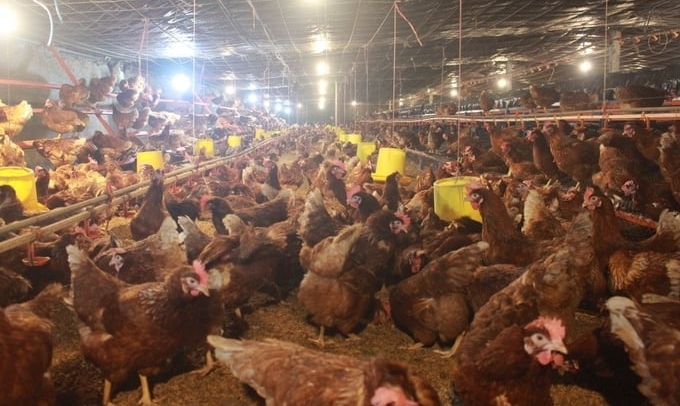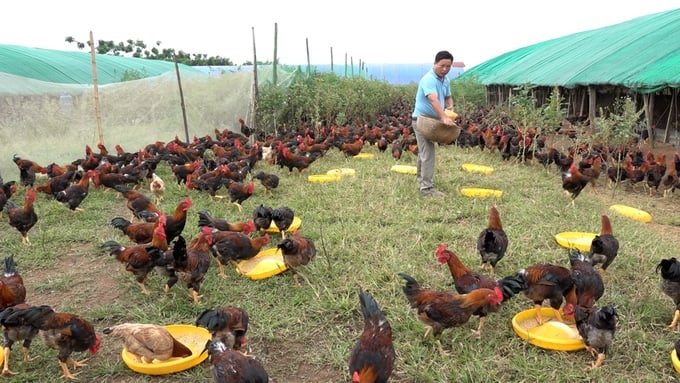June 16, 2025 | 07:39 GMT +7
June 16, 2025 | 07:39 GMT +7
Hotline: 0913.378.918
June 16, 2025 | 07:39 GMT +7
Hotline: 0913.378.918

More than 6,600 poultry will be forced to be destroyed in the first two months of 2024. Photo: Hong Tham.
According to the WOAH and the FAO, from the beginning of 2023 to the end of January 2024, there have been 8,850 avian influenza outbreaks caused by avian influenza virus strains caused by A/H5.
In Cambodia in 2023, 6 people were infected with avian influenza A/H5N1. Of which there were four deaths. From the beginning of 2024 until now, the evolution of the bird flu epidemic here continues to be complicated. Four people were infected with avian influenza A/H5N1, and there was one death in some border provinces bordering Vietnam.
In Vietnam, the Department of Animal Health informed that 20 A/H5N1 avian influenza outbreaks will appear in 2023 in 17 districts of 11 localities, with the number of sick, dead, and destroyed poultry being 36,606.
In the first months of 2024, many outbreaks of A/H5N1 bird flu appeared in the provinces of Bac Ninh, Ninh Binh, Tien Giang, and Long An, with the number of sick, dead, and forced destruction of poultry being over 6,600.
The Prime Minister has repeatedly directed ministries, branches, and localities to actively and proactively prevent the avian influenza epidemic and avoid widespread spread. In particular, people need to be aware of the risk of the virus of avian influenza infection due to the illegal importation of poultry and poultry products.
On May 18, 2023, the Prime Minister issued Official Dispatch No. 426/CD-TTg on preventing, detecting, and strictly handling cases of illegal trading and transportation of poultry and poultry products across borders into Vietnam.
On January 31, 2024, he continued to issue Official Dispatch No. 12/CD-TTg on strengthening prevention and strict handling of cases of smuggling and illegal transportation of animals, animal products and breeds farming and aquaculture across the border into Vietnam.

Poultry farming households must proactively prevent epidemics, vaccinate against avian influenza, and practice biosafety farming. Photo: Hong Tham.
Faced with the new situation, the Ministry of Agriculture and Rural Development requests the People's Committees of provinces and cities to urgently handle emerging bird flu outbreaks, control them, and prevent the disease from lingering, recurring, and spreading widely, publicize the epidemic, organize anti-epidemic activities according to regulations.
In addition, localities need to review and vaccinate new and additional vaccinations against avian influenza for poultry flocks, ensuring at least over 80% of the total herd at the time of vaccination.
The grassroots veterinary system must proactively monitor, take samples for testing, detect early, promptly warn, and thoroughly handle cases positive for avian influenza virus and new outbreaks that arise, and prevent spread widely and swiftly notify the health sector when outbreaks are detected in poultry flocks.
Poultry owners have measures to increase the application of biosafety farming, proactively prevent epidemics, and vaccinate poultry flocks against avian influenza.
Because poultry trading and transportation activities are still complicated, localities must closely monitor this activity and strictly handle cases of illegally transporting and trading poultry and poultry products across the border. , origin unknown. In addition, inspections should be strengthened to ensure food safety and hygiene, especially at poultry processing, consumption, and transportation facilities.
The Provincial People's Committee directs the health sector to proactively implement surveillance activities and early detection of suspected cases of respiratory infections with a history of contact with poultry and poultry products for isolation and treatment. Timely treatment and management to avoid infection in the community.
At the same time, widely propagate the epidemic situation, ensure hygiene in poultry farming and slaughter, do not use poultry of unknown origin, poultry and poultry products that have not been quarantined, or use meat. Poultry must be cooked, blood pudding must not be eaten, and measures must be taken to prevent and control avian influenza.
Working groups are organized regularly to inspect and urge the work of preventing and fighting avian influenza epidemics and building disease-free livestock facilities and areas.
Currently, Vietnam is in the month of general cleaning, disinfection, and environmental detoxification, phase 1/2024. Therefore, the Ministry of Agriculture and Rural Development requests localities to pay attention and actively implement it from March 1 - 31 and allocate funds for effective implementation, especially cleaning and disinfecting trail and path areas open borders.
Commune-level authorities organize general cleaning teams and spray disinfectants for household livestock areas, markets selling live animals and fresh animal products, places where live animals and products are collected animal products for trade and business, landfill areas, treatment and destruction of diseased animals, animal products carrying pathogens, areas for collecting and treating animal waste. Disinfection spraying must be done after mechanical cleaning, such as sweeping, scrubbing, and washing.
Concentrated livestock facilities, centralized animal slaughter facilities, poultry egg incubation facilities, waterfowl, etc., proactively allocate funds to organize cleaning, disinfection, and detoxification at the facility and surrounding area under the supervision of local authorities and veterinary authorities.
The animal quarantine agency closely coordinates with the authorities on duty at the border gate to advise the Border Gate Management Board to organize the application of hygiene and disinfection measures for animal transport vehicles and products passing through border gates.
Translated by Tuan Huy

(VAN) The UNESCO Global Geopark revalidation of Non nuoc Cao Bang and the transition to a two-tier administrative model are presently undergoing a pivotal moment in Cao Bang, the northernmost province of Vietnam.
/2025/06/13/5330-2-004539_953.jpg)
(VAN) Changing policy mindset and removing investment barriers are urgent requirements to open up new development space for enterprises in the agricultural sector.

(VAN) The areas include the restoration of five million hectares of marine ecosystems.

(VAN) Dr. Le Van Nguyen, Director of the Institute of E-Commerce Management (ECM), emphasizes the potential for green development through the cultivation of fruit trees, particularly in provinces such as Son La.

(VAN) VAAS and numerous Vietnamese enterprises have signed cooperation agreements with Japanese partners to promote agricultural technology and trade connectivity.
/2025/05/29/5625-12-214801_567.jpg)
(VAN) Provincial mergers in the Mekong Delta promise to streamline administration, expand inter-provincial raw material areas, and foster close linkages in agricultural value chains, benefiting both businesses and cooperatives.

(VAN) Merging Mekong Delta provinces contributes to the expansion of agricultural raw material areas, addressing previous constraints caused by provincial boundaries. Additionally, this expansion will reduce costs and strengthen linkages between businesses, cooperatives, and farmers.